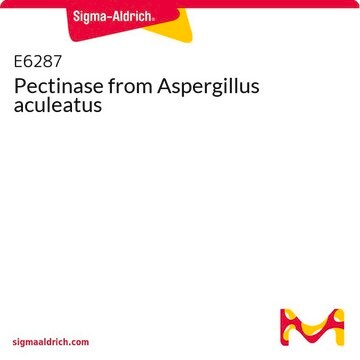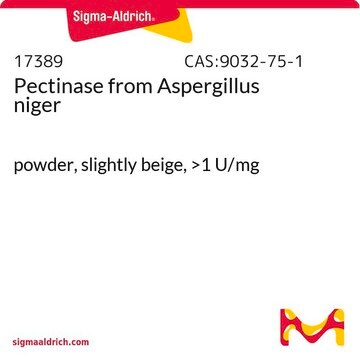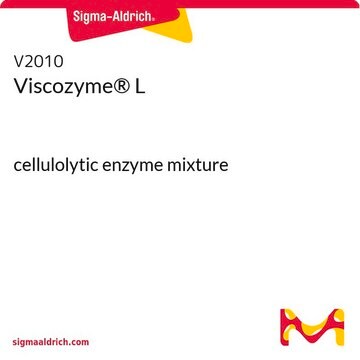P2736
Pectinase from Aspergillus niger
aqueous solution
Synonym(s):
Pectinex 3XL®, Pectinex® 3X L
Sign Into View Organizational & Contract Pricing
All Photos(1)
About This Item
Recommended Products
form
aqueous solution
concentration
≥3000 units/mL
storage temp.
2-8°C
Application
Petctinase is an enzyme from Aspergillus niger that is used in plant protoplast preparation to digest cell wall prior to organelle isolation. It has been used to conduct partial saccharification of sugars. Pectinases are used to study their role in the invasion of plant tissues by phytopathogens, the spoilage of produce and various food processing and plant biotechnology applications.
Biochem/physiol Actions
Pectolytic enzyme preparation produced from a selected strain of Aspergillus niger: contains mainly pectintranseliminase, polygalacturonase, and pectinesterase and small amounts of hemicellulases and cellulases. Pectinases hydrolyses pectin, which is a component of the cell wall. They may attack methyl-esterified pectin or de-esterified pectin. It is a source of pectinase activity, also containing cellulase and hemicellulase activities.
Other Notes
View more information on enzymes for complex carbohydrate analysis at www.sigma-aldrich.com/enzymeexplorer
Legal Information
A product of Novozyme Corp.
Pectinex is a registered trademark of Novozymes Corp.
replaced by
Product No.
Description
Pricing
signalword
Danger
hcodes
pcodes
Hazard Classifications
Resp. Sens. 1
Storage Class
11 - Combustible Solids
wgk_germany
WGK 3
flash_point_f
Not applicable
flash_point_c
Not applicable
ppe
Eyeshields, Gloves, multi-purpose combination respirator cartridge (US)
Choose from one of the most recent versions:
Already Own This Product?
Find documentation for the products that you have recently purchased in the Document Library.
Customers Also Viewed
Meredith C Edwards et al.
Applied and environmental microbiology, 77(15), 5184-5191 (2011-06-15)
Ethanologenic Escherichia coli strain KO11 was sequentially engineered to contain the Klebsiella oxytoca cellobiose phosphotransferase genes (casAB) as well as a pectate lyase (pelE) from Erwinia chrysanthemi, yielding strains LY40A (casAB) and JP07 (casAB pelE), respectively. To obtain an effective
Mi Wei et al.
Bioresource technology, 146, 549-555 (2013-08-27)
A novel method utilizing microbial treatment for cleaner production of diosgenin from Dioscorea zingiberensis C.H. Wright (DZW) was presented. A new Bacillus pumilus HR19, which has the great ability to secrete pectinase, was screened and applied in the microbial treatment.
Sara Posé et al.
Journal of experimental botany, 64(12), 3803-3815 (2013-07-23)
Antisense-mediated down-regulation of the fruit-specific polygalacturonase (PG) gene FaPG1 in strawberries (Fragaria×ananassa Duch.) has been previously demonstrated to reduce fruit softening and to extend post-harvest shelf life, despite the low PG activity detected in this fruit. The improved fruit traits
Joan Ho-Huu et al.
BMC evolutionary biology, 12, 195-195 (2012-10-03)
Gene duplications are a molecular mechanism potentially mediating generation of functional novelty. However, the probabilities of maintenance and functional divergence of duplicated genes are shaped by selective pressures acting on gene copies immediately after the duplication event. The ratio of
Isabelle Benoit et al.
BMC genomics, 13, 321-321 (2012-07-21)
Pectins are diverse and very complex biomolecules and their structure depends on the plant species and tissue. It was previously shown that derivatives of pectic polymers and oligosaccharides from pectins have positive effects on human health. To obtain specific pectic
Our team of scientists has experience in all areas of research including Life Science, Material Science, Chemical Synthesis, Chromatography, Analytical and many others.
Contact Technical Service










